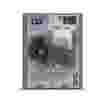Choosing the correct air blower involves analyzing several factors:
First, you must consider the required flow rate, as the process needs a specific amount of air.
Pressure also plays an important role, as different applications demand different pressure levels.
The choice of gas is very important. Some gases require special materials or designs. This is to avoid corrosion or chemical reactions.
Thinking about environmental conditions is important. Temperature and humidity can affect how well the blower works.
Finally, energy efficiency is essential, as it directly influences long-term operating costs.
Why is Energy Efficiency Important in Air Blowers?
Energy efficiency is a key aspect of air blowers, both economically and environmentally. More efficient models consume less energy to perform the same tasks, reducing operating costs.
This is particularly important in industries where blowers operate continuously or for extended periods. Moreover, with the current focus on sustainability, these blowers help companies comply with environmental regulations and emission reduction goals. They also contribute to reducing the carbon footprint by generating fewer greenhouse gases.
What Maintenance Do Air Blowers Require?
Blower maintenance depends on the type of equipment and its usage, but general practices ensure efficiency and extend lifespan:
Regular Cleaning: Prevents dust and debris buildup that could obstruct airflow or cause wear.
Inspection of Bearings and Seals: Frequent checks help prevent mechanical failures.
Filter Replacement: Periodically replacing filters ensures clean air supply free from contaminants.
Heavy-Duty Use: For heavy applications, check lubrication systems regularly. Also, perform vibration analysis to find signs of wear or problems.
Preventive Maintenance Program: Tailored to specific operating conditions, this approach helps avoid unexpected downtime and costly repairs.





